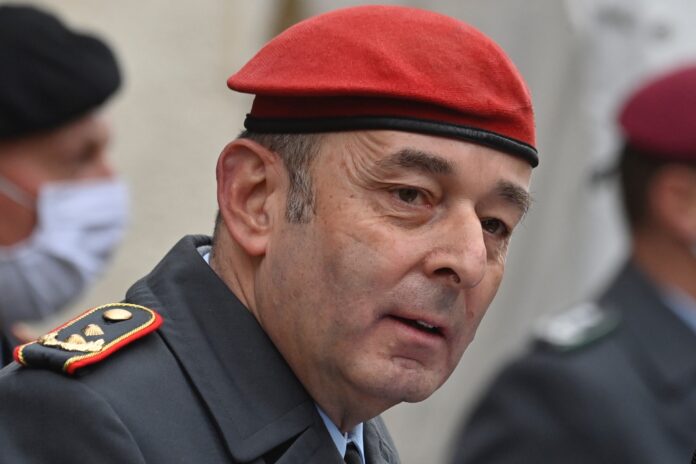Carsten Breuer, the highest-ranking solider of the German military and an ally of the North Atlantic Treaty Organization (NATO), told German media on Saturday that he fears Russia may invade Germany and start a “defensive” war.
It’s been almost two years since Russia launched its full-scale invasion of Ukraine in February 2022. Over the past few weeks, Russian troops have launched a major offensive targeted at Avdiivka, a town in Ukraine’s eastern Donetsk region that Moscow also claims as its territory. It followed a major Ukrainian counteroffensive during the summer and autumn. Kyiv regained some territory, but failed in its larger objective to punch through to the Black Sea, severing Russia’s land bridge to Crimea, which Russian President Vladimir Putin annexed in 2014.
Germany has been a strong ally of Ukraine in its ongoing war with Russia. In October, the country’s defense ministry announced a new support package for Kyiv that is worth around $1.1 billion for weapons, vehicles and air defense.
In an interview with the Frankfurter Allgemeine Sonntagszeitung, Breuer, whose official title is Inspector General of the Bundeswehr, said he’s concerned with how Russia is “rearming at the moment.”
John Macdougall/AFP via Getty Images
He added that Germany would have to get used to the possibility “that we might have to fight a defensive war one day.”
Breuer was also asked if the German military would be able to take on a Russian attack on NATO, which Germany is a part of, after the possible end to the Russia-Ukraine war. Breuer said, “Yes. Period. We have no alternative. We can defend ourselves, and we will defend ourselves.”
However, Breuer did admit that the German military has deficiencies when it comes to national and alliance defense after focusing on international crisis management for years.
“We now see a Bundeswehr [the armed forces of Germany] that is not yet sufficiently equipped for this,” he said, adding that there are “structures that make quick and targeted decisions almost impossible.”
Newsweek reached out to Germany’s Ministry of Defense and NATO via email as well as the Russian government via online form for comment.
In October, Russian state television propagandist Vladimir Solovyov threatened on his show that Germany will eventually exist “under a Russian flag.”
Solovyov criticized Germany for increasing the amount of supplies it was sending to Ukraine and said, “So we have no other option. We will finish, we will take Berlin once again, and this time we will not leave.”
The U.S. State Department has said Solovyov spreads disinformation from the Kremlin and wrote on its website last year in a list identifying well-known figures involved in Russian propaganda that Solovyov “may be the most energetic Kremlin propagandist around today.”
Currently, NATO has 31 members, including 29 European countries, the United States, and Canada. Ukraine has been in the process of joining since before Russia’s invasion.
NATO has said that it cannot consider Russia for membership because of the country’s “hostile policies and actions.” The military alliance has also said that it “fully supports” Ukraine’s right to self-defense and condemns “Russia’s brutal and unlawful war of aggression against Ukraine.”
Early on in the Russia-Ukraine war, Putin repeatedly said the eastward expansion of NATO was the reason for launching his full-scale invasion of Ukraine.
Uncommon Knowledge
Newsweek is committed to challenging conventional wisdom and finding connections in the search for common ground.
Newsweek is committed to challenging conventional wisdom and finding connections in the search for common ground.


